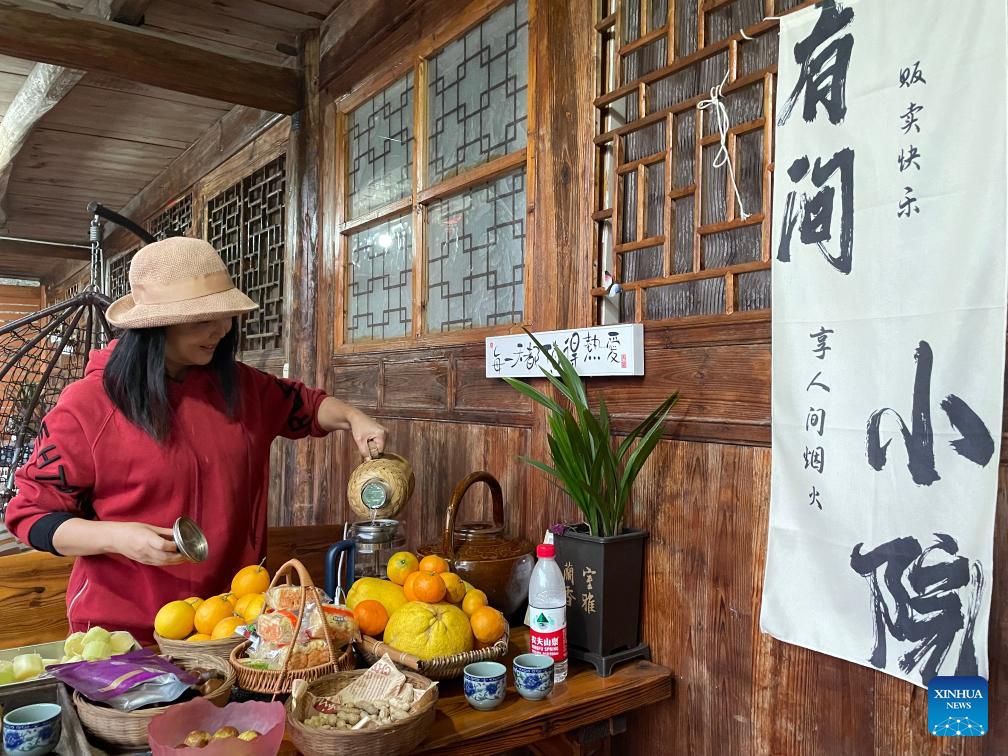
 0 Comment(s)
0 Comment(s) Print
Print E-mail Xinhua, January 2, 2024
E-mail Xinhua, January 2, 2024
Zhang Jingmei makes tea in Fangshiping Village of Huaihua City, central China's Hunan Province, Nov. 20, 2023. [Photo/Xinhua]
Golden pomelos hanging from branches, a row of potted succulents and a slumbering orange cat all feature in a winter scene in the new home of Yin Ping and Yin Ling, as it defies the chill to present a vibrant courtyard.
This old house in Fangshiping village, central China's Hunan Province, had long been in a state of disrepair until it was rented and renovated by the Yin sisters, who moved to the city of Huaihua when they were young but now enjoy spending time in a second dwelling in the countryside.
The village features more than 100 old houses built in the 1980s according to the local architectural style. However, many of them have been empty for years after their owners bought new houses in cities or built modern brick ones, said Zhang Zhongyu, Party chief of the village.
"It would have been a pity to tear down the old houses, if we couldn't find ways of reusing them," Zhang said.
In 2019, the arrival of the Yin sisters brought new ideas. They represent a growing number of urban dwellers drawn by natural scenery, a caring community and the feeling of returning to one's roots in the countryside. After boosting rural travel statistics, some of these nostalgic urbanites are now looking at renting village houses.
"We lived in the countryside when we were children, so we are particularly attached to such wooden houses. After working and living for years in the city, we wanted to rent a wooden house to spend more time in the countryside," Yin Ping said.
With the villagers committee serving as intermediary, the sisters signed a lease agreement with the owner of the old house and became the first recipients of the title of "honorary villagers" of Fangshiping.
To welcome the "new villagers," locals helped the sisters find materials and contact craftsmen to repair the partially rotten wooden structure of the house. The tenants, on their part, contributed innovative decorations, ranging from hand-stitched curtains to creative calligraphy.
"We originally rented it for weekends, but now that we are retired we plan to stay longer," Yin Ping said. "We can pick wild kiwis and chestnuts on the mountain or visit our neighbors' homes. Life here can be exciting."
Encouraged by the successful leasing of the derelict cabin, the village started to promote the model of renting old wooden houses to urban residents. So far, 15 wooden houses in the village have been rented out.
"Recently there have been several groups of people coming to see the old houses, showing they are really in demand!" Zhang said.
The sudden influx of urban tenants was not without controversy. In Fangshiping, there were complaints about newcomers disrupting the locals' peaceful lives.
"But with more interactions, the original villagers have come to realize that the 'new villagers' not only brought new income, but also injected vitality into the village," Zhang said.
Zhang Jingmei, also from Huaihua, rented a courtyard located along the path to the mountain. "Our yard is never locked, and we often invite passing villagers to drink tea in the yard and take some rest. Some villagers share with us freshly picked forest products from the mountain," she said.
"As we get closer, we have a stronger sense of belonging and wish to do something to make our village better," Zhang said, adding that she plans to build a book bar in her courtyard to provide a reading space for village children.
Zhang Zhongyu believes the old houses have opened a new opportunity to propel rural revitalization, which is being vigorously implemented across the country.
"In the future, we plan to rely on old houses to create more new rural businesses. For example, our village is developing a leisure tour project, and the old houses can be made into home inns to allow more urbanites to find nostalgia in the countryside," Zhang said.
Go to Forum >>0 Comment(s)